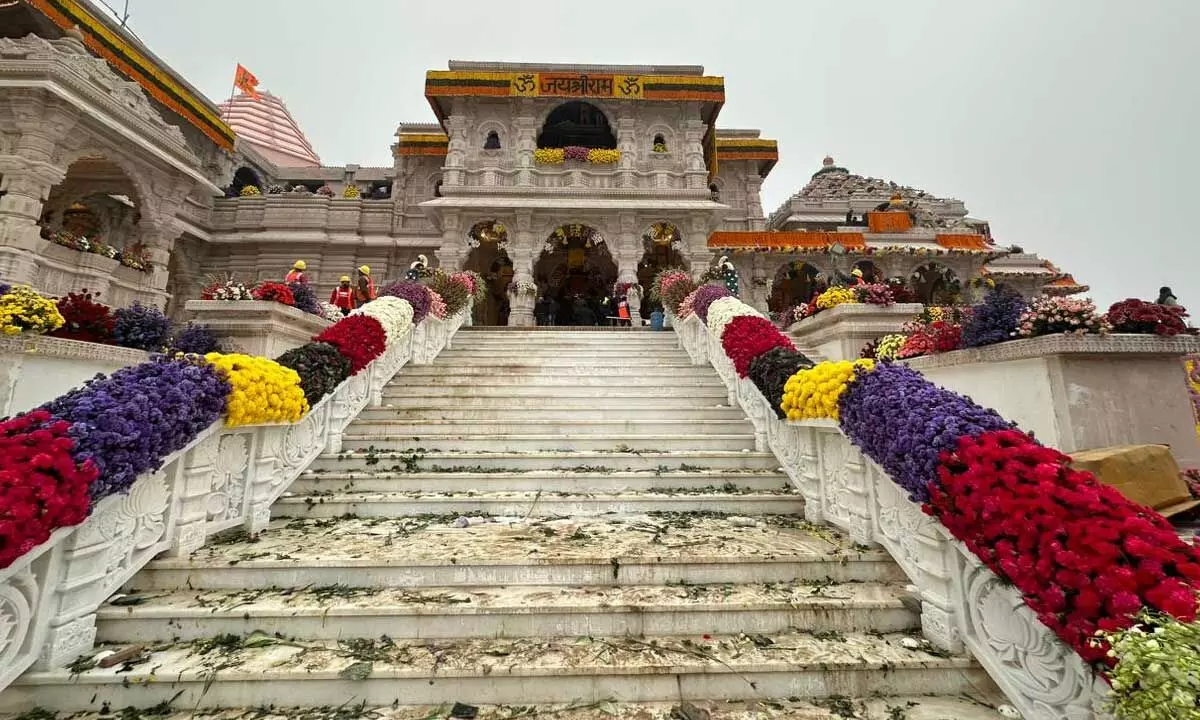75Years Saga of Ram Mandir

Almost seven decades after the first court case was filed over the Ayodhya Ram mandir-Babri masjid dispute in post-independence India, in 2019, the Supreme Court delivered a landmark verdict paving the way for the construction of Ram mandir.
Almost seven decades after the first court case was filed over the Ayodhya Ram mandir-Babri masjid dispute in post-independence India, in 2019, the Supreme Court delivered a landmark verdict paving the way for the construction of Ram mandir.
With the Ram mandir consecration ceremony in Ayodhya taking place today significant events took place leading up to this moment that millions across the country, if not the world, have been anticipating for years.
In 1949, Gopal Singh Visharad filed a petition before a Faizabad court to worship the deity ofRam Janambhoomi after idols of Ram Lalla were found inside Babri Masjid. Muslims claim that Hindus placed idols of Lord Ram inside the mosque, leading to civil suits by both parties. The government proclaims the premises a disputed area and locks the gates. In 1961, Mohammad Hashim filed a lawsuit seeking the restoration of the property to Muslims. The Sunni Central Waqf Board filed a suit in Faizabad civil court, declaring Babri Mosque as property of the board.
Although RSS offshoot Vishwa Hindu Parishad (VHP) was formed in 1964, Ram mandir was on its agenda only in the early 1980s. The VHP spearheads a movement to ‘liberate’ the birthplace of Lord Ram and build a temple. Then Bharatiya Janata Party (BJP) leader LK Advani takes over the leadership of the campaign. In 1986, Ayodhya District Judge K M Pandey ordered the gates of the disputed mosque to be opened to allow Hindus to worship there on a plea by Hari Shankar Dubey. The Babri Mosque Action Committee was formed on February 06.
In 1989, The VHP laid the foundations of a Ram temple on land adjacent to the disputed mosque. Four suits that were pending at the Faizabad court were transferred to a special bench of the High Court. The BJP, led by then-President LK Advani, ordered a nationwide Rath Yatra from Somnath in Gujarat to Ayodhya, Uttar Pradesh in 1990. The procession passed through hundreds of cities and villages and led to several communal riots. VHP volunteers partially damaged the mosque. Prime Minister Chandra Shekhar tried to resolve the dispute through negotiations. In 1991, the BJP was voted to power in Uttar Pradesh.
On December 6, 1992, Babri mosque was torn down by VHP supporters, the Shiv Sena party, and the BJP, which resulted in riots leading to 2,000 deaths. In 2001, tensions rose on the anniversary of the demolition of the mosque. VHP pledges again to build a Hindu temple at the site. Vajpayee established an Ayodhya unit in his office and assigned a senior official, Shatrughna Singh, to conduct negotiations with Hindu and Muslim leaders.
In January 2003, archaeologists conducted a court-ordered survey to find out whether a temple to Lord Ram existed on the site. The survey claimed there is evidence of a temple beneath the mosque, but Muslims disputed the findings. On September 30, 2010, the Allahabad High Court ordered that the 2.77-acre disputed site be divided into three parts among the Hindus, the Muslims, and the Nirmohi Akhara. Petitions filed by Mahant Suresh Das, the Sunni Central Board of Wakfs, Nirmohi Akhara, the Akhil Bharat Hindu Mahasabha, Jamiat Ulama-I-Hind, and others challenged the verdict. A petition was also filed on Ram Lalla's behalf to challenge the High Court decision. In 2011, the Supreme Court stayed the high court order of splitting the disputed site into three parts.
In November 2019, a five-judge bench of the Supreme Court ordered the disputed land to be handed over to a trust to build the Ram Janmabhoomi temple. The court also directed the government to give the Sunni Waqf Board five acres of land in another location to build a mosque.
On August 5 2020, the foundation stone for the construction of the Ram Temple was laid by Prime Minister Narendra Modi. He performed Bhoomi Poojan and laid the foundation stone of the grand Ram temple. Modi became the first Prime Minister to have darshan at Ram Janmabhoomi and Hanumangarhi temples in Ayodhya.After the inauguration of Ram Mandir on Monday, the construction activity will be continued and will be completed by 2024.
10-STEP PRAN PRATHISHTA CEREMONY
Shobha Yatra: Ram Lalla Idol will be taken out for procession
Ganesh Puja: Ceremony will begin after worshipping Lord Ganesha
Purification of Idols: Ram Lalla Idol will be cleansed with chants, mantras and offerings
The Adhivas: Ram Lalla Idol will be placed in seclusion, will be submerged in water and grain
Ritual Bath: Ram Lalla Idol will be bathed in holy waters
Opening of the eyes: Ram Lalla’s eyes to be opened
Kajal Ceremony: Prime Minister Narendra Modi to apply kajal in Ram Lalla’s eyes using gold pencil
Invocation of Deities: Priests will chant mantras to invite Ram Lalla to reside in idol
First Prayer: Ram Lalla Idol will be worshipped for first time
Offering Bhog: Ram Lalla Idol will be offered its first bhog
MAJESTIC MANGAL DHWANI Origin of Instruments
Uttar Pradesh: Pakhwaj, Flute, Dholak
Madhya Pradesh: Santoor
Karnataka: Veena
Manipur: Pung
Punjab: Algoja
Assam: Nagada, Kali
Maharashtra: Sundari
Chattisgarh: Tambura
Odisha: Mardala
Delhi: Clarinet
Gujarat: Santar
Rajasthan: Ravanahatha
Bihar: Pakhawaj
West Bengal:Srikhol, Sarod
Uttarakhand:Hudka
Prasad for Ram Lalla’s Bhakts prepared by artisans of Kashi
Thepla made of gram flour and fenugreek
A packet of Almond barfi
Matar Kachori
Puris
Gajar Matar Beans Sabzi
Mango and Chilly pickle














